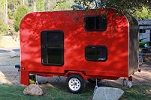grounding the cabin battery
17 posts
• Page 1 of 2 • 1, 2
grounding the cabin battery
Hi all,
I am working on my first build, and have a Dc/12 volt system electrical question: I will have battery in the tongue box or possibly under the floor. How do i ground it? What is the connection point and how do i make it?
thank you?
I am working on my first build, and have a Dc/12 volt system electrical question: I will have battery in the tongue box or possibly under the floor. How do i ground it? What is the connection point and how do i make it?
thank you?
-

mariannf - Teardrop Master
- Posts: 193
- Joined: Wed Oct 28, 2015 3:13 am
Re: grounding the cabin battery
Typically you supply a ground bar (-) along with the 12 volt DC (+) buss bar (fuse panel) for connecting electrical loads... To ground to chassis (frame) you can just use one connection point on ground bar and run a wire off ground bar directly to a convenient point on frame(chassis) ... Typically at frame you would drill hole for bolt or screw, clean metal to bright shiny surface and crimp a connector (terminal) on cable and then secure connector to frame using a dab of dielectric grease to prevent corrosion.... Other method my be to take ground wire directly off negative (-) connector of battery directly to chassis...
It's not rocket science, its just providing a electrical bath from negative (-) side of battery to frame of TD...
In many cases if you do proper wiring from electrical device to fuse/ground panel it may not even be necessary to ground chassis... That being said there are safety issues and if you have one wire electrical (light) circuits (grounded at frame body at device) and charge by towing and 120 V AC circuitry in trailer it may be prudent to have proper frame chassis ground on DC circuits also...
Dale
It's not rocket science, its just providing a electrical bath from negative (-) side of battery to frame of TD...
In many cases if you do proper wiring from electrical device to fuse/ground panel it may not even be necessary to ground chassis... That being said there are safety issues and if you have one wire electrical (light) circuits (grounded at frame body at device) and charge by towing and 120 V AC circuitry in trailer it may be prudent to have proper frame chassis ground on DC circuits also...
Dale
Lives his life vicariously through his own self.
Any statement made by me are strictly my own opinion.
You are free to ignore anything I say if you do not agree.

Any statement made by me are strictly my own opinion.
You are free to ignore anything I say if you do not agree.

-

Dale M. - 2000 Club

- Posts: 2693
- Images: 18
- Joined: Thu Jun 09, 2005 8:50 pm
- Location: Just a tiny bit west of Yosemite National Park

 Sorry...It looks like I've written another "book".
Sorry...It looks like I've written another "book".